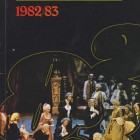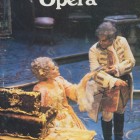Manon Lescaut 1982Scottish Opera
Read more about the opera Manon Lescaut
Scottish Opera turned its attention for the first time to Puccini's problematic treatment of the Manon story. Alexander Gibson was renowned as a Puccini conductor, but John Cox had done little in this area of the repertoire. His staging turned out well, in generally attractive period designs. (though the moon landscape for the Louisiana desert looked a bit strange).
Perhaps the oddest thing about the production was that after this initial tour of fifteen performances it was never revived. Audiences will flock to Bohème, Tosca and Butterfly while, it seems, strangely ignoring this lovely work, for which Puccini himself had a soft spot.
The cast was excellent, led by Nelly Miricioiu, not yet known in London, following her excellent Violetta and Tosca with something more unusual. Her control of the pathos through the final scene was completely memorable. The Finn Peter Lindroos was better suited to Puccini than he had been to the Verdi and Strauss roles he had previously sung at Covent Garden.
Two fine baritones joined the company for the first time - Canadian Gino Quilico and American Norman Phillips. Both were excellent actors who produced as much subtlety as the role of Lescaut would allow. It may be that the most surprising company debut was that of the veteran Raimund Herincx. He was nearing the end of a long singing career with nearly every British company except for Scottish Opera.
The Festival's opera programme
The 1982 Edinburgh Festival had an Italian theme, though the opera programme did not follow this slavishly. Scottish Opera at least performed an opera by a composer generally ignored in the past - Puccini - and Manon Lescaut had not been seen in Scotland since Carl Rosa days, nearly thirty years before.
German opera companies had often visited Edinburgh. However these were generally from the West - Hamburg, Munich, Stuttgart or Cologne. Here, less than a decade before the seemingly miraculous removal of the Wall, we had a famous company from the East. The Dresden State Opera was closely connected with Richard Strauss, as the launchpad for most of his operas, If Ariadne auf Naxos was actually premiered elsewhere, it did at least fit the intimate King's Theatre well, and also linked to the Festival's Italian theme through its commedia element. German companies also tended to bring a Mozart singspiel, either Zauberflöte, or, as here, Entführung,
Welsh National Opera's contribution was Handel - the first Scottish performances of Tamerlano. This tied in very neatly with a second Handel masterpiece, Ariodante, that ended the Festival in a lovely production by the Piccola Scala from Milan. They also brought a delightful early Rossini comedy, La pietra del paragone.
Performance Cast
- Edmondo a student
- Chevalier des Grieux
- Lescaut a sergeant in the King's Guards
-
Gino Quilico (Edi, Gla)
Norman Phillips (New, Liv, Abn)
- Geronte di Ravoir Treasurer-General
- Manon Lescaut
- Innkeeper
- Wig-maker
- Musician
- Dancing-Master
- Lamp-lighter
- Sergeant of Archers
- Naval Captain
Performance DatesManon Lescaut 1982
King's Theatre, Edinburgh | Edinburgh
22 Aug, 19.30 27 Aug, 19.30 31 Aug, 19.30
Theatre Royal, Newcastle | Newcastle-upon-Tyne
14 Sep, 19.15 16 Sep, 19.15 18 Sep, 19.15
Empire Theatre, Liverpool | Liverpool
21 Sep, 19.15 23 Sep, 19.15 1 Oct, 19.30
His Majesty's Theatre, Aberdeen | Aberdeen
29 Sep, 19.30
Theatre Royal, Glasgow | Glasgow
6 Oct, 19.15 9 Oct, 19.15 12 Oct, 19.15 14 Oct, 19.15 16 Oct, 14.15



